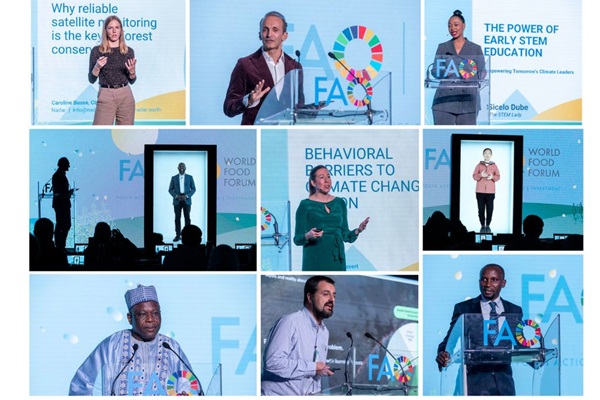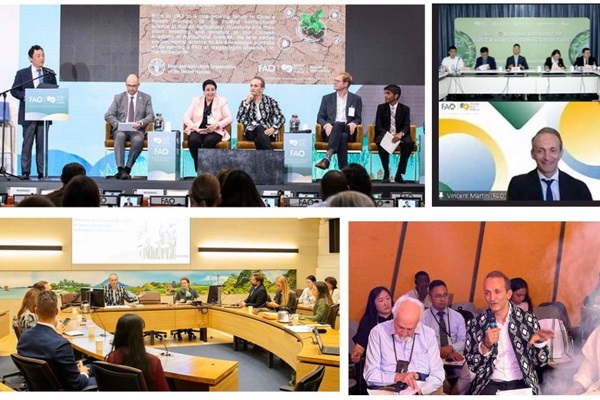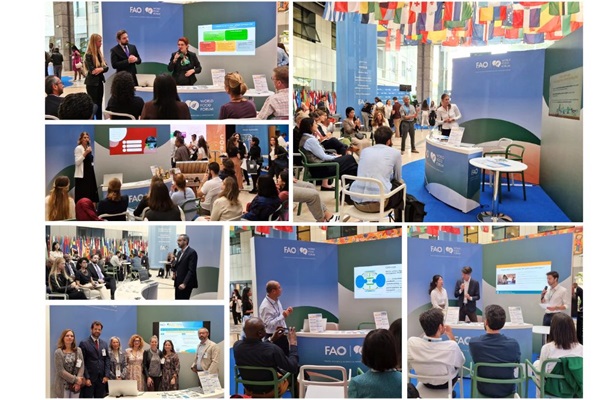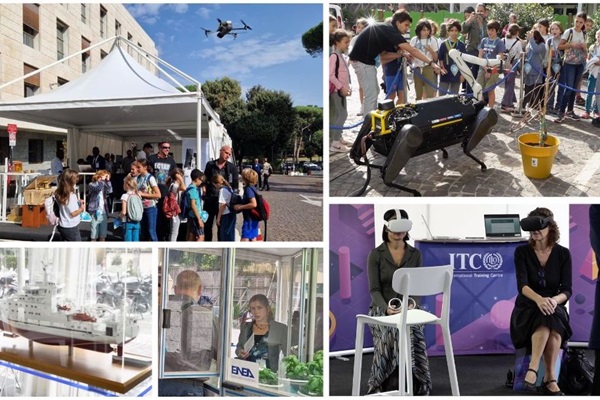The overarching theme, Science and Innovation for Climate Action, for the second edition of the the FAO Science and Innovation Forum focused on exploring the applications of innovative science and technologies to accelerate the transformation of agrifood systems, making them more resilient and adaptive to extreme climate patterns.
Opening the doors to collaboration
The Science and Innovation Forum (SIF) featured 20 events to illustrate how science, technology and innovation can be a powerful engine to end poverty, hunger and malnutrition while helping to mitigate the effects of climate change and increase the resilience of global agrifood systems.
Nearly 150 speakers from research, academia, business, government and non-governmental organizations gathered, in Rome and online, to share their perspectives during the numerous roundtables and panel discussions at the Forum. The Office of Innovation (OIN) prepared, led and contributed to several of the high-level sessions, as described.
Advancing Climate Action
The first technical SIF session was a TedTalk session entitled, “Future Forward: Advancing Climate Solutions through Science, Innovation and Technology”, moderated by OIN’s Director, Vincent Martin, which gathered examples of science-based evidence of climate change adaptation and mitigation, technological advancements and innovative solutions suitable for agrifood system actors.
“Innovation is about taking risks, it’s about embracing the future, it’s about leading from the emerging future. Innovation is also about mindset: it’s about thinking of solutions rather than focusing on problems”, said Vincent Martin, setting the stage for the session.
Innovation starts by taking the action, no matter how small, for a different outcome. Christina Gravert, a behavioural economics associate professor at the University of Copenhagen, illustrated how small actions by many can create monumental shifts towards sustainability. “Making conscious choices consistently can reduce our carbon footprint and protect our planet.”
Investing in the Future
She was followed by Sicelo Dube, a Mandela Washington Fellow and Zimbabwe’s Science Ambassador, who passionately advocated on the importance of empowering children and girls in particular, through STEM (science, technology, engineering and mathematics) because “This is not just an investment in their future but a promise of prosperity for our communities. When we nurture young minds, we inspire the next generation of innovators.”
Luis Adaime, Founder & CEO of MOSS.Earth, explained that it is possible to combat climate change and preserve the Amazon via a digital transaction platform for carbon credits. To do this we must fuse economic insights with a deep commitment to sustainability, "We absolutely must stop Amazon deforestation. 90% of all Amazon deforestation comes from burning for agribusiness. By using carbon credits, we can make the forest worth more standing than deforested".
Caroline Busse, CEO and co-founder of Nadar, a remote sensing company offering better and more reliable forest carbon and deforestation monitoring for organizations in the voluntary and commodity supply chain markets, stated, “I cannot overstress the pivotal role of reliable satellite monitoring as a powerful tool to break the connection between agriculture and deforestation, fostering a future where our forests thrive alongside sustainable agricultural practices.”
Beaming in via hologram
Navi Radjou, co-author of the bestsellers Frugal Innovation and Jugaad Innovation, who was streamed into the session as a hologram, spoke about the importance of frugal innovations and how simple yet ingenious solutions can not only make the most of limited resources but were also key to addressing global challenges. “We must figure out how to produce and distribute more food using fewer resources. Frugal innovation is a disruptive strategy that aims to do better with less.”
Also participating as a hologram was Chinese farmer Shi Yan, who founded Little Donkey Farm in 2011, China's first Community Supported Agriculture (CSA) and Shared Harvest Farm in 2012, which has since grown to serve 800 families in Beijing and uses the power of social media to update its community on produce availability and drop-off locations.
Sowing success: collaborative action
In his special remarks, the Minister of agriculture and natural resources of Rwanda ldephonse Musafiri stressed the need to act now, while the Minister of agriculture and rural development of Cameroon, Gabriel Mbairobe closed the session by underscoring that technology and innovation alone cannot bring about agrifood systems transformation.“We must foster collaboration between governments, the private sector, research institutions, and civil society.” he said.
Watch the replay of this session here.


Having access to appropriate tools
The session “AI and Digital Tools for Climate Resilient Agrifood Systems” discussed the potential of digital tools to revolutionize the agrifood sector. With access to the right technological tools, farmers can wield these advances for more efficient and resilient agriculture, revolutionizing traditional agricultural practices into sophisticated, data-driven systems. This is why modern agriculture must incorporate these important innovations to tackle challenges like climate change and dwindling natural resources. That said, there were calls for caution in using these tools and to do so in an inclusive and responsible manner. Furthermore, the unchecked use of these tools could create more bias, result in less inclusion or even widen the digital divide. To counteract this, “The Rome Call for AI Ethics, signed by FAO, IBM and Microsoft is an initiative that supports a transparent, inclusive, responsible, impartial, reliable and secure approach to AI” –Vincent Martin, FAO Director of the Office of Innovation
Watch the replay of this session here.
Harvesting Ideas
The session “Emerging technologies and innovations in response to agrifood system transformation: foresight calls for action”, again moderated by OIN’s Director, Vincent Martin, revolved around long-term participatory and evidence-based planning of agrifood system transformation. The discussion focused on findings from the horizon scanning on Science, Technology and Innovation (STI), envisaging technologies and Innovations scenarios for a long-term strategic visioning and recommendations for resources and capacities allowing the global community to maximize on benefits and minimize challenges of STI in agrifood systems.
SIF Exhibition: Innovation in Action
The FAO Atrium was buzzing with exhibitors encouraging and inspiring the 2000 participants and 1000 children in equal measure. Featuring more than 42 interactive talks and demonstrations showcasing innovative approaches by FAO and its partners, the exhibition highlighted cutting-edge innovations. These ranged from drones, immersive virtual reality, and circular bioeconomy to agricultural robots, plant growth simulators, advanced sensors, nuclear-related equipment, a behavioural science corner, and other interactive experiences.
OIN organised numerous events, including the talks Exploring the future: Horizon scanning and foresight to tackle agrifood challenges, Circular bioeconomy in Abidjan: From Food Waste to Fork - a project of the FAO Incubator and “Catalysing and scaling innovation: FAO Incubator”. The FAO Incubator Team also held a demonstration in the outdoor space Game of Drones: new and safe ways for pandemic preparedness and showcased projects with a specific focus on youth engagement and the dual role of youth as both beneficiaries and catalysts in the transformation of agrifood systems, shedding light on their innovative capacity.
.


Other OIN-led talks:
The FAO Digital Agriculture team spoke about “Harnessing the power of digital agriculture: The Global Network of Digital Innovation Hubs and other FAO initiatives” - Digital agriculture is at the forefront of revolutionizing our food systems by harnessing the power of digital technologies to pilot, accelerate, and scale innovative ideas;
“Fostering an innovation culture: Using Behavioural Science and internal processes to cultivate change” - FAO early adopters of behavioural science shared their experiences with how this approach has created new opportunities and fostered new ways of thinking and strengthened FAO's culture of innovation;
“Digitalization for child labour monitoring along agrifood value chains” - presented the collaborative work between FAO and Wageningen University and Research to explore the potential application of innovative technologies to improve data collection and risk estimation of child labour in the cocoa sector, which was recently shared in a joint publication. Find out more here from Laureen Philipps.
“Agricultural innovation pathways: Strengthening innovation capacities with the TAP-AIS project” showcased the vast experience of the TAP-AIS project in capacity development for agricultural innovation in Asia, Africa and Latin America. In particular, the talk focused on the Malawi and Cambodia cases of multistakeholder collaboration and policy dialogue processes.
“The role of professional associations in strengthening the agricultural extension and advisory services in the context of agricultural innovation systems” Agricultural extension and advisory services professional associations play key roles in support-ing national agricultural innovation systems, providing technical support and forward evidence-based policy recommendations but little attention is given to their potential contribution to strengthening the capacity of AIS.
“Empowering farmers in partnership with researchers: Multi-actor agricultural innovation platforms (MAIP)”, presented FAO’s holistic approach to facilitating information and knowledge exchange, along with technological innovations, among all the key agricultural value chain actors for sustainable agricultural development.
Furthermore, the Exhibition featured talks by FAO's Italian partners, namely the National Research Council (CNR), Council for Agricultural Research and Economics (CREA), Italian National Agency for New Technologies, Energy and Sustainable Economic Development (ENEA) and the Italian Institute for Environmental Protection and Research (ISPRA).
The Exhibition provided a unique chance to explore the latest advancements, participate in stimulating discussions, and be part of the conversation on how technology and innovation can help agrifood systems cope with the climate crisis.
Looking forward
As science, technology and innovation are key drivers to transform the agrifood system, it is clear that to tackle the unprecedented challenges of the climate crisis necessitates cross-sector collaborations and strong partnerships as well as more “out-of-the-box” thinking. Business as usual is no longer an option. There is an urgent need for more engagement and more collaboration with the stewards of our agrifood systems, Indigenous Peoples, youth, women and farmers associations.
Science, technology and innovation are crucial to achieve climate resilience, adoption and mitigation. Working on several fronts from digital innovation in agriculture to behavioural science, the Office of Innovation is constantly engaged in finding innovative solutions so that collectively climate action is advanced.
“I'm inspired by the progress we've witnessed and the transformative power of innovation. Our shared vision for a sustainable, efficient, resilient, and inclusive future is taking shape, and I'm excited to see the innovations that will emerge from these discussions. Let's continue to push the boundaries of what's possible and work together to create a brighter future for all, leaving no one behind.” –Vincent Martin, FAO Director of the Office of Innovation
